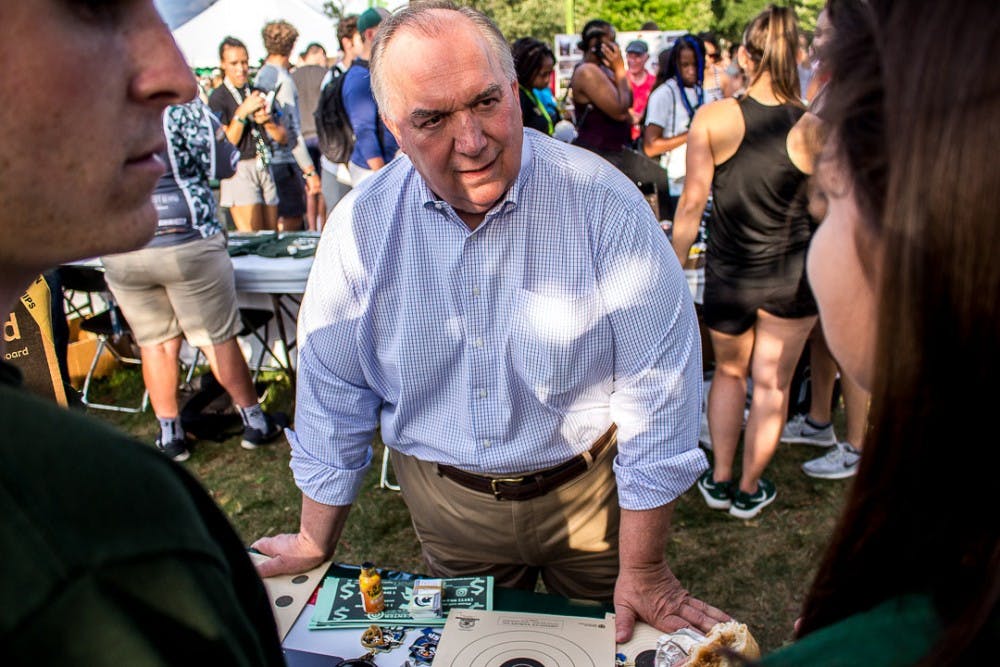
The magazine that arrived in alumni mailboxes this summer, beaming with Spartan green and packed with stories of the university’s accomplishments, replaced the survivor inspired “teal issue” that took a hard look at sexual assault.

The magazine that arrived in alumni mailboxes this summer, beaming with Spartan green and packed with stories of the university’s accomplishments, replaced the survivor inspired “teal issue” that took a hard look at sexual assault.
The MSU alumni magazine people received fulfilled the mandate set for it from its conception, “to reflect positively both on Michigan State University and on its alumni.”
The original issue set out to bring attention to the various responses to hundreds of survivors of ex-MSU doctor Larry Nassar’s sexual abuse. In Paula M. Davenport’s editor’s note, she said the magazine did its best to share stories and insights surrounding sexual abuse in hopes that such acts would never again occur on MSU’s campus. She ended by noting an expectation to continue this story in future issues.
This editor’s note, along with the majority of the initial issue, was gutted by Interim President John Engler.
“There never was one issue, there were probably six or seven different proposed front pages. There were lots of different articles,” Engler said.
On Aug. 24, The State News published the original special issue of the MSU alumni magazine after obtaining it from someone close to Engler’s administration.
Making the magazine
Editors from the MSU alumni magazine presented the idea of a special issue focusing on sexual misconduct to writer and MSU alumna Louise Knott Ahern earlier this year. She said she was invited to voice her feelings and to write whatever she was feeling as a Spartan. If she was mad, to be mad. If she was upset, to be upset.
“I really feel like the magazine staff has to be praised here because they right up front said ‘These are your words, we want authenticity. We want authentic voices. We are not going to censor you,’” Ahern said.
After the magazine edited her piece for length, Ahern said she heard crickets. Her essay, calling out the MSU administration for its complacency toward a sexual predator, was not discussed again. She had a feeling something had gone wrong.

MSU faculty member, alumna, parent and survivor Stephanie McCann first wrote her portion of the special issue as a Facebook post. She said she wanted to show her fellow alumni that they are not alone in weighing their pride in being Spartans with their disgust at being part of a community that contributed to Nassar’s abuse.
Alumni shared McCann’s words on different social media platforms and a member of alumni relations reached out to her in February to include the post in the special issue.
“Initially I thought ‘Well, will there be repercussions?’ But, when you know better, you do better,” McCann said. “When you know it’s the right thing to do, you do it and that’s exactly what I did.”
MSU isn’t the first school to use its alumni magazine as a platform to reflect on and unpack its scandals. Penn State famously focused one of its alumni magazines in 2012 on former football coach Jerry Sandusky’s 52 counts of sexual abuse. Tina Hay, who has been the editor of the Penn Stater since 1996, said her staff have been fortunate to work under an administration that appreciates honesty in talking about campus issues.
“I feel for my colleagues at Michigan State. I’m sure that the magazine staff wanted to do it the right way and it sounds to me as though the higher-ups had other ideas,” Hay said. “The best public relations is honesty, not spin.”
The greenwashing
When alumni received their magazines, the original cover art giving recognition to sexual abuse survivors was washed over with Spartan green and a quote from Engler.
The new magazine celebrates MSU for having faced “the most difficult challenge in its history,” slating MSU as a leader in research and an ever-improving conduit for the humanities.
Support student media! Please consider donating to The State News and help fund the future of journalism.
Engler decided the special issue was not balanced and scrapped it.
“What I was hearing as I traveled around the country talking to our alums, they say is ‘How do I tell a Wolverine or a Buckeye who’s in my face making these statements about our campus, what’s going on here. What are we doing?’” Engler said. “They were well aware of what the problem was and we’re never going to forget that, but what have we done? We’ve done a lot, so I felt it was important to have balance and the first magazine didn’t have the kind of balance that I thought we needed.”
The MSU administration has long been critiqued for its handling of sexual assault on campus and has made changes in the past year. In its 2018-19 budget, 10 new positions in the Counseling and Psychiatric Services were created, along with 13 new Title IX-related positions.
However, there has still been backlash. Many feel the administration is too focused on moving on, rather than dismantling the systems they feel allowed Nassar to thrive in the first place. This outrage is often focused on Engler, including social media outcry over him spiking the alumni magazine.
“Somehow he thinks, he controls when and how we move on from this and he doesn’t,” Ahern said. “It was a horrible move. It was insulting to a whole lot of people and you know what, mainly it was insulting to the survivors. It’s one more way that university administration has told them ‘you’re an afterthought, you’re a nuisance, you’re something we simply have to get over and get through’ and they’re not. What MSU allowed him (Nassar) to get away with for so long, we’re going to be dealing with for a very long time.”

Nassar survivor and MSU alumna Amanda Thomashow said the image of this year that the new magazine paints, though pretty, does nothing to erase the horrible events that transpired at MSU. She said creating a false narrative of success and progress is a disservice to victims of sexual abuse and to MSU students.
“The original magazine cover and content, it spoke about the horrible things that happened, but it also talked about moving forward and allowing past mistakes to guide us towards future successes,” Thomashow said. “I value honesty and transparency and accountability and as an alumna, I was disappointed in my university for trying to erase what happened and paint it in a nicer lighting.”
The aftermath
Alumni expressed dissatisfaction with the magazine they received and asked for the publication of the “teal issue” on social media.
The new magazine features a Q & A with Engler, giving insight into leadership at MSU during a year of crisis.
“We’re builders here. We always have been. Let’s get back to doing that ... I think you’ll see ... greater respect for Michigan State as we conduct ourselves the way a leading global university should,” Engler said in the magazine.
Emily Guerrant, vice president and university spokesperson, gave this statement in response to the changed magazine and said the statement still reflects the university’s stance on the topic.
“Michigan State supports robust discussion of important issues such as sexual assault and its own place in this national conversation. The material being presented, as it is described to us, would represent content not included in the most recent issue of our alumni magazine. As such, it would be material solicited and accepted by Spartan magazine, so in our opinion has a valuable place in the ongoing public conversation.
“Our concern, then as now, is one of context as the university moves with due haste and concern not only to address past issues, but to take action to ensure the health, safety and well-being of the campus community and to ensure that our alumni and the public are duly provided with that information.
“As we have said before, the magazine is intended to communicate and promote university programs, highlighting staffing, alumni and student success stories and important issues to MSU alumni. Given its three-month production process, it has been difficult for the Spartan Magazine team to stay ahead of the news cycle.
“During the course of development, the team was continuously evaluating many possible options for content and for feature stories. In the end, the editorial team took an approach that concentrated on the most important changes and improvements at MSU that have been made over the past six months related to campus safety and sexual assault prevention and education, as well as where the university is headed in the future.
“Alumni consistently communicate to the magazine team that they want to know what is happening on campus, so striking a balance between addressing the problems of the past but also showing the positive impact Spartans are having across a variety of fields was the desired outcome.”
McCann, also a clinical social worker, said people heal when they feel heard and that alumni needed to be heard in this magazine.
“I think it diminishes survivors’ experiences and survivors’ stories, which is very unhealthy because people need to feel heard and need to know that they’re in a safe community to tell their story,” McCann said. “It censors the reality of this past year in a way that’s untrue … Maybe that is the experience or that’s the truth for one person, but that is not the collective understanding of what this past year has been like.”
Read the original magazine here.